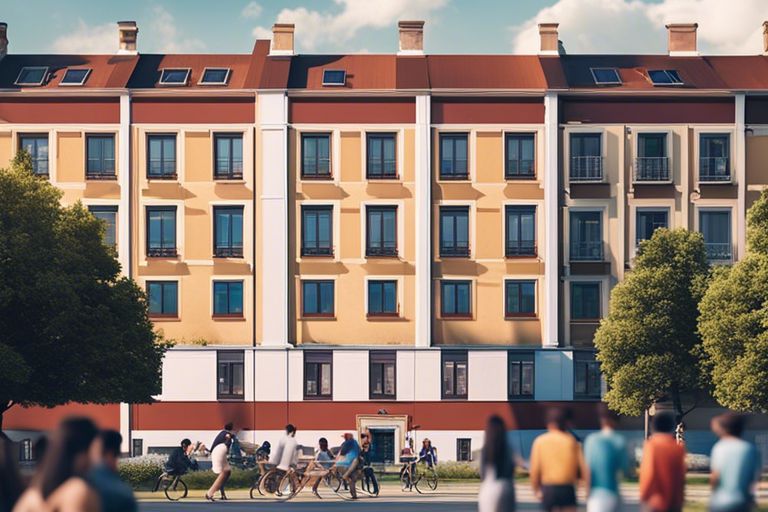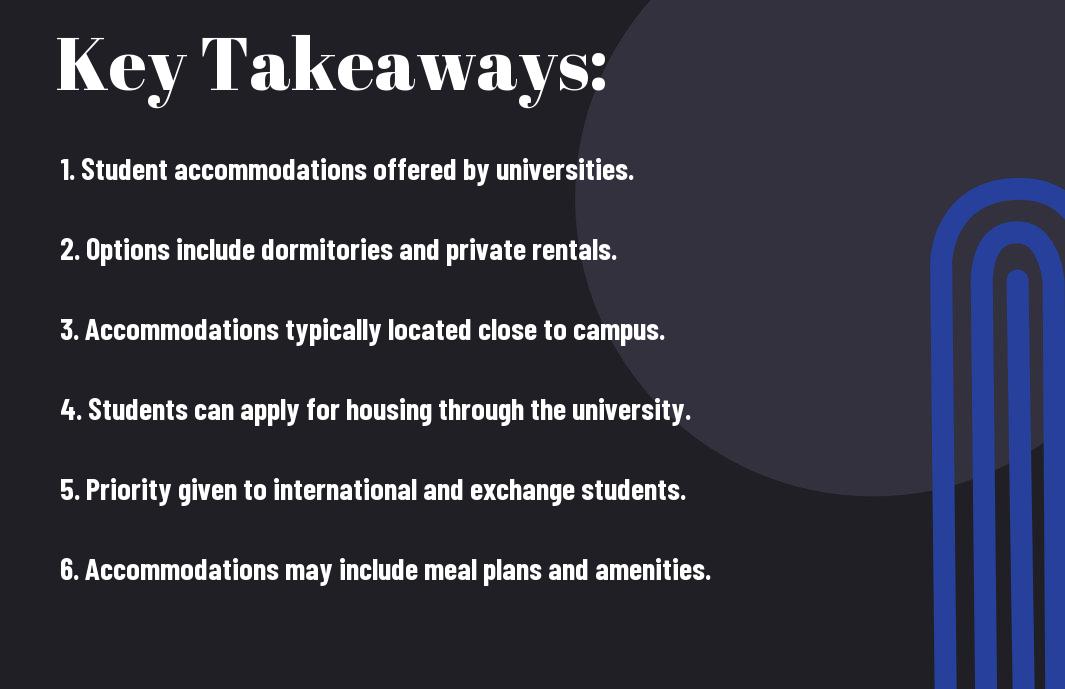Persnickety students often find themselves in a conundrum when searching for suitable accommodations in Hungary. With a wide array of options available, it can be overwhelming to navigate the process. In Hungary, student accommodations are diverse and cater to a variety of needs and preferences. From dormitories to shared apartments, students have various options to choose from. Understanding how student accommodations work in Hungary can be crucial in making the right decision for your stay.
Types of Student Accommodations
There are several types of student accommodations available in Hungary, catering to the diverse needs and preferences of students. Some of the main types of student accommodations include:
- On-campus housing
- Off-campus housing options
- Short-term and temporary lodgings
- Homestays
- Private apartment rentals
Throughout Hungary, students can find suitable housing that meets their individual needs and budget.
On-Campus Housing Options
Accommodations on-campus are a popular choice for many students, offering proximity to university facilities and a vibrant community environment. The options range from single rooms to shared apartments, providing students with convenient and secure living arrangements.
Off-Campus Housing Varieties
Any students who prefer to live off-campus have a variety of options to choose from. These may include private apartment rentals, homestays with local families, or shared housing with other students. Off-campus housing allows for greater independence and flexibility in choosing one’s living environment.
Types of off-campus housing in Hungary can vary widely in terms of amenities, location, and cost, providing students with a diverse array of choices.
Short-term and Temporary Lodgings
Options for short-term and temporary lodgings cater to students who may only need housing for a limited period, such as a semester or academic year. These accommodations may include dormitory-style residences, short-term apartment rentals, or temporary homestays.
Housing options for short-term and temporary stays are especially beneficial for exchange students or those participating in study abroad programs, providing them with a convenient and flexible living arrangement during their time in Hungary.
Accessing Student Accommodations
The process of accessing student accommodations in Hungary involves several steps that students must follow. Understanding the eligibility criteria, application procedures, deadlines, and key dates is essential for a successful application.
Eligibility and Application Procedures
Eligibility for student accommodations in Hungary is typically based on factors such as enrollment status, financial need, and nationality. International students may be required to provide additional documentation, such as a visa or residency permit, to be considered for housing options. Application procedures often vary by institution, but they generally involve submitting an online application, providing proof of enrollment, and demonstrating financial need through documentation such as bank statements or scholarship awards.
Deadlines and Key Dates for Applications
On top of meeting the eligibility requirements, students must pay close attention to deadlines and key dates for accommodation applications. Deadlines for applying for student housing in Hungary often coincide with the academic calendar, so it is crucial for students to plan ahead and submit their applications on time. Additionally, keeping track of key dates, such as housing assignment notifications and move-in dates, is essential for proper planning and preparation.
Procedures for accessing student accommodations in Hungary can be competitive, especially in popular university cities. It is important for students to stay organized and proactive throughout the application process to increase their chances of securing suitable housing.

Costs and Financial Considerations
Despite the many benefits of studying in Hungary, the costs and financial considerations of student accommodations are important factors for students to consider. From the average costs of student housing to budgeting tips and financial aid options, understanding the financial aspects of student accommodations in Hungary is crucial for a successful study abroad experience.
Average Costs of Student Housing in Hungary
Considerations for student housing costs in Hungary include rent, utilities, and additional fees. On average, students can expect to pay around 100,000 to 150,000 HUF per month for a shared apartment or dormitory room in major cities like Budapest and Debrecen. Keep in mind that costs may vary depending on the location, amenities, and type of accommodation. It’s important for students to research and compare housing options to find the best fit for their budget and needs.
Budgeting Tips and Financial Aid Options
Any student planning to study in Hungary should create a detailed budget to account for living expenses, including accommodation, food, transportation, and leisure activities. It’s also important to explore financial aid options, such as scholarships, grants, and student loans, offered by the Hungarian government, universities, and other organizations. Assume that part-time work opportunities may also be available for international students, but it’s essential to confirm work regulations and restrictions.
The availability of student accommodations in Hungary varies depending on the city, university, and time of year. Students should consider their preferences and priorities, such as location, amenities, and shared living arrangements, when exploring housing options. Assume that thorough research and planning are necessary to secure suitable and affordable accommodations in Hungary.
Legal and Practical Considerations
Unlike some other countries, student accommodations in Hungary are governed by specific legislation that outlines the rights and responsibilities of both landlords and tenants. Understanding the legal framework is crucial for both parties to ensure a smooth and fair rental experience.
On the one hand, tenants have the right to a safe and habitable living space, as well as protection from discriminatory practices. They also have the responsibility to pay rent on time, maintain the property in good condition, and adhere to the terms of the rental agreement.
Rights and Responsibilities of Tenants
On the other hand, landlords are responsible for providing a well-maintained property and addressing any maintenance issues in a timely manner. They also have the right to receive rent on time and to terminate the lease if the tenant fails to fulfill their responsibilities.
Practical guidelines for navigating agreements and understanding contracts are essential for both tenants and landlords to ensure a clear understanding of the terms and conditions of the rental agreement. Seeking legal advice or assistance in interpreting complex legal language can provide clarity and peace of mind for all parties involved.
Contracts should outline the terms of the rental agreement, including rent amount, payment schedule, maintenance responsibilities, and any additional fees or charges. Both landlords and tenants should carefully review and understand the contract before signing to avoid any misunderstandings or disputes in the future.


Conclusion
With these considerations, it is clear that student accommodations in Hungary are designed to cater to the diverse needs of students from different backgrounds. By offering a range of options including dormitories, private apartments, and hostels, the system ensures that students can find accommodation that suits their preferences and budget. Additionally, the availability of support services and amenities within these accommodations further enhances the overall experience for students. The process of securing student accommodations in Hungary involves careful planning and consideration of individual needs, but ultimately ensures that students are able to focus on their studies and enjoy a comfortable living environment during their time in the country. Overall, the student accommodation system in Hungary is well-structured and provides valuable support to students pursuing their academic goals.


